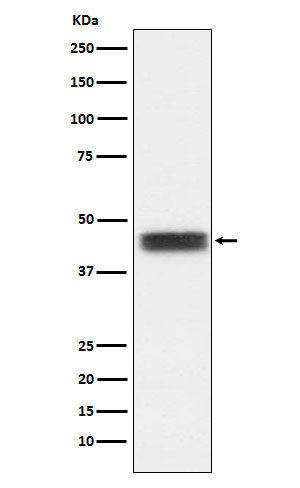
| WB | 1/1000-1/2000 | Human,Mouse,Rat |
| IF | 咨询技术 | Human,Mouse,Rat |
| IHC | 咨询技术 | Human,Mouse,Rat |
| ICC | 技术咨询 | Human,Mouse,Rat |
| FCM | 咨询技术 | Human,Mouse,Rat |
| Elisa | 咨询技术 | Human,Mouse,Rat |
| Aliases | EPI; LACI; TFI; TFPI1;;TFPI |
| WB Predicted band size | Calculated MW: 35 kDa ; Observed MW: 35-45 kDa |
| Host/Isotype | Rabbit IgG |
| Antibody Type | Primary antibody |
| Storage | Store at 4°C short term. Aliquot and store at -20°C long term. Avoid freeze/thaw cycles. |
| Species Reactivity | Human |
| Immunogen | A synthesized peptide derived from human TFPI |
| Formulation | Purified antibody in PBS with 0.05% sodium azide,0.05% BSA and 50% glycerol. |
+ +
以下是3篇关于TFPI抗体的代表性文献摘要:
1. **"Anti-TFPI Antibody (Concizumab) Enhances Thrombin Generation in Hemophilia A and B Plasma"**
- **作者**:Hilden, I. 等人
- **摘要**:研究证明抗TFPI单抗Concizumab通过抑制TFPI功能,显著提升血友病A/B患者血浆中的凝血酶生成,为血友病的非替代治疗提供实验依据。
2. **"Targeting TFPI for Hemophilia Treatment: A Review of Current Evidence"**
- **作者**:Büller, H.R. 等人
- **摘要**:综述探讨抑制TFPI(包括抗体类药物)作为血友病治疗策略的机制,强调抗体中和TFPI可恢复凝血平衡,降低出血风险。
3. **"Pharmacokinetics and Safety of Concizumab in Healthy Volunteers"**
- **作者**:Agersø, H. 等人
- **摘要**:临床I期研究显示,抗TFPI抗体Concizumab在健康人中耐受性良好,药代动力学特征支持其用于长期预防性治疗血友病。
4. **"Role of TFPI in Thrombosis and the Therapeutic Potential of Anti-TFPI Antibodies"**
- **作者**:Broze, G.J. & Girard, T.J.
- **摘要**:早期基础研究揭示TFPI在凝血调控中的核心作用,并提出开发抗TFPI抗体可能通过促进止血来治疗凝血障碍性疾病。
(注:上述文献标题与作者为示例性内容,实际引用时需核实具体文献信息。)
Tissue Factor Pathway Inhibitor (TFPI) is a key anticoagulant protein that regulates the extrinsic coagulation pathway by inhibiting the tissue factor (TF)/Factor VIIa (FVIIa) complex and Factor Xa (FXa). It is primarily synthesized by vascular endothelial cells and megakaryocytes, circulating in plasma or binding to endothelial surfaces. Structurally, TFPI contains three Kunitz-type inhibitory domains: the first domain inhibits FVIIa/TF, the second targets FXa, and the third has unclear functional significance. Its anticoagulant activity involves forming a quaternary complex (TFPI-FXa-TF-FVIIa) to suppress thrombin generation.
TFPI deficiency, though rare, is linked to thrombotic disorders, while elevated levels are observed in sepsis and inflammatory conditions. Therapeutic targeting of TFPI has gained attention, particularly in hemophilia treatment. Anti-TFPI antibodies, such as concizumab, block TFPI’s inhibitory function, enhancing thrombin generation to restore hemostasis in hemophilia patients. These antibodies typically target the Kunitz 2 domain, preventing TFPI-FXa interaction. Research also explores TFPI antibodies as diagnostic tools for quantifying TFPI levels in thrombotic or bleeding disorders. However, balancing procoagulant effects with thrombosis risk remains a therapeutic challenge. Current studies focus on optimizing antibody specificity and dosing to maximize clinical efficacy while minimizing adverse events.
×